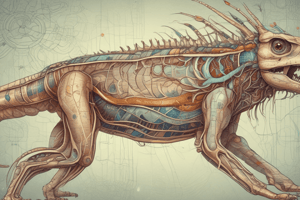Podcast
Questions and Answers
What is the primary function of the peripheral nervous system?
What is the primary function of the peripheral nervous system?
- Connecting sensory neurons to the brain (correct)
- Producing hormones
- Communicating information about the surroundings (correct)
- Regulating body temperature
The central nervous system is composed of cranial nerves and spinal nerves.
The central nervous system is composed of cranial nerves and spinal nerves.
False (B)
What are the two categories into which the nervous system is broadly divided?
What are the two categories into which the nervous system is broadly divided?
Peripheral nervous system and central nervous system
Match the following nervous system components with their functions:
Match the following nervous system components with their functions:
Which gland is not part of the human endocrine system?
Which gland is not part of the human endocrine system?
What is the main role of hormones in the endocrine system?
What is the main role of hormones in the endocrine system?
The ___ is known as the satiety center in the brain.
The ___ is known as the satiety center in the brain.
Endocrine glands have ducts connecting them to specific body parts.
Endocrine glands have ducts connecting them to specific body parts.
Which of the following is NOT a classification of hormones?
Which of the following is NOT a classification of hormones?
Flashcards are hidden until you start studying
Study Notes
Nervous System Overview
- Comprises specialized cells (neurons and glia) for information communication regarding surroundings and internal states.
- Divided into two main categories: Central Nervous System (CNS) and Peripheral Nervous System (PNS).
- CNS includes the brain and spinal cord.
- PNS consists of cranial and spinal nerves, connecting sensory neurons to the CNS.
Peripheral Nervous System Functions
- Sensory (Afferent) Division:
- Involves somatic and visceral sensory nerves.
- Motor (Efferent) Division:
- Contains motor nerve fibers for response actions.
- Further divided into:
- Sympathetic Division: Activates "fight or flight" responses.
- Parasympathetic Division: Manages "rest and digest" activities.
Central Nervous System Regulation
- Important for central regulation functions, including:
- Feed intake regulation:
- Ventromedial area: Satiety center, prevents overeating.
- Lateral area: Feeding center, motivates appetite.
- Preoptic area: Regulates body temperature.
- Feed intake regulation:
Endocrine System Overview
- Composed of specialized organs and tissues producing, storing, and secreting hormones.
- Endocrinology: Branch of physiology focusing on body tissue coordination via chemical mediators.
Hormone Functions and Classifications
- Hormones play crucial roles in:
- Body growth and development.
- Control of various tissue functions.
- Support of pregnancy and reproductive activities.
- Metabolism regulation (catabolism and anabolism).
- Hormone classifications include:
- Simple proteins
- Glycoproteins
- Steroids
Major Endocrine Glands
- Key glands include:
- Hypothalamus
- Pituitary gland
- Thyroid and parathyroid glands
- Adrenal glands
- Pineal body
- Reproductive glands (ovaries and testes)
- The pancreas is also part of the endocrine system despite its primary digestive functions.
Studying That Suits You
Use AI to generate personalized quizzes and flashcards to suit your learning preferences.




